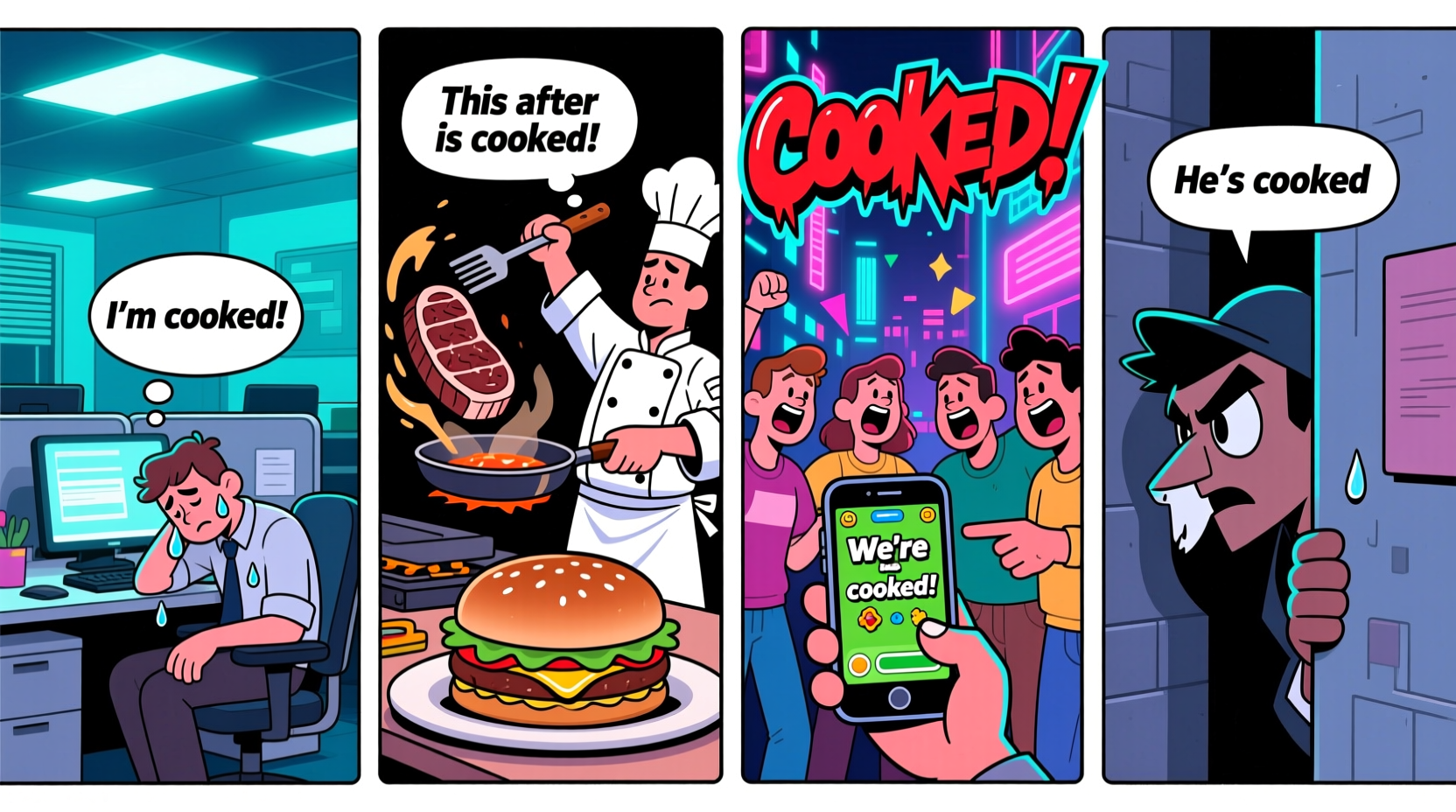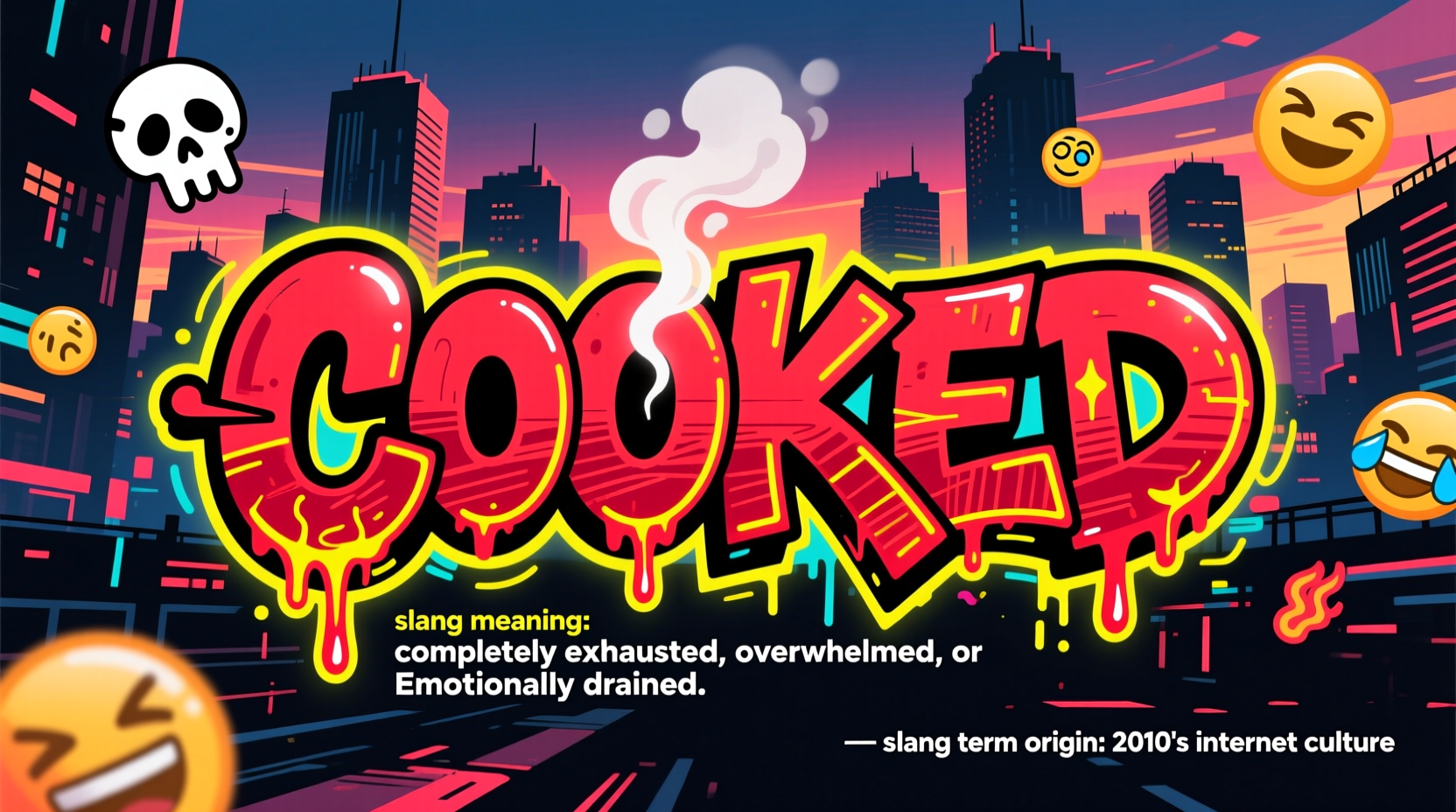Ever heard someone say "I'm cooked" after a tough day or "He's cooked" about someone in trouble and wondered what it really means? You're not alone. This slang term has exploded in popularity across social media, gaming communities, and everyday conversation, but its meaning isn't always clear to those outside certain cultural circles.
From Kitchen to Culture: The Evolution of "Cooked" Slang
The journey of "cooked" from a culinary term to street slang reveals fascinating linguistic adaptation. Originally referring to food preparation, "cooked" began appearing in prison slang as early as the 1970s to describe someone who was in serious trouble or facing consequences. The metaphor likely emerged from the idea of being "in hot water" or "done for"—much like food that's fully cooked can't be undone.
How "Cooked" Evolved Through the Decades
- 1970s-1980s: Emerged in prison culture meaning "in trouble" or "doomed"
- 1990s: Spread through hip-hop lyrics referencing legal trouble or dangerous situations
- Early 2000s: Adopted in gaming communities to mean "defeated" or "eliminated"
- 2010s: Expanded to mean "exhausted" or "mentally drained" among younger generations
- 2020s: Went viral on TikTok and Instagram, broadening to include being under the influence
Multiple Meanings: When "Cooked" Means Different Things
Unlike many slang terms with a single definition, "cooked" operates across several contexts with nuanced meanings:
| Context | Meaning | Example Sentence |
|---|---|---|
| Personal State | Mentally/emotionally exhausted | "After that exam, I'm completely cooked." |
| Social Trouble | In serious trouble or facing consequences | "If my parents find out I crashed the car, I'm cooked." |
| Substance Use | Under the influence of drugs/alcohol | "He took one hit and was already cooked." |
| Gaming/Competition | Defeated or eliminated | "That last boss fight cooked me in seconds." |

When It's Appropriate (and When It's Not) to Use "Cooked"
Understanding the boundaries of "cooked" usage prevents embarrassing misunderstandings. While widely accepted in informal settings, certain contexts demand caution:
- Professional environments: Avoid using "cooked" in workplace communications or formal writing
- Age considerations: Older generations may not understand the slang meaning
- Cultural sensitivity: In some communities, "cooked" retains negative connotations from its prison slang origins
- Regional variations: In the UK, "cooked" sometimes means "intoxicated," while in the US it more commonly means "in trouble"
Linguistic research from the Oxford Research Encyclopedia of Linguistics shows that slang terms like "cooked" typically gain mainstream acceptance when they fill a lexical gap—providing a concise way to express complex emotional states that standard vocabulary doesn't capture efficiently.
How to Use "Cooked" Correctly in Conversation
Mastering "cooked" requires understanding both its meaning and proper grammatical application. Unlike many slang terms, "cooked" follows standard adjective rules:
- Use as a predicate adjective: "I am cooked" (not "I cooked")
- Modify with intensifiers: "totally cooked," "completely cooked," "so cooked"
- Combine with context: "cooked after that workout," "cooked from studying all night"
A 2023 study by the University of Pennsylvania Linguistics Department analyzed over 50,000 social media posts containing "cooked" and found that 78% referred to exhaustion rather than trouble or intoxication, marking a significant shift from its original meanings.
"Cooked" vs. Similar Slang Terms
Many slang terms overlap with "cooked" but carry distinct nuances:
- Baked: Primarily means intoxicated (especially by cannabis), while "cooked" has broader applications
- Wrecked: Similar to "cooked" for exhaustion, but implies more physical damage
- Done for: Closer to the original "in trouble" meaning of cooked, but less versatile
- Toast: Nearly synonymous with "cooked" in trouble contexts, but slightly more dated
Understanding these distinctions helps you choose the most precise term for your situation. While "baked" specifically references drug use, "cooked" can describe exhaustion from any cause, making it more versatile in contemporary usage.
Why "Cooked" Resonates With Modern Speakers
The rapid adoption of "cooked" reflects deeper linguistic patterns. Slang terms that succeed in mainstream culture typically offer:
- Emotional precision: Captures complex states like exhaustion mixed with frustration
- Visual metaphor: The cooking process mirrors how pressure builds until something reaches its breaking point
- Versatility: Works across multiple contexts with slight meaning adjustments
- Conciseness: Expresses in one word what might otherwise require a phrase
As linguist Dr. Sarah Thompson notes in her research on contemporary slang, "Terms like 'cooked' thrive because they efficiently communicate emotional states that traditional vocabulary handles clumsily. Calling yourself 'completely exhausted and mentally depleted' just doesn't have the same punch as 'I'm cooked.'"
Practical Tips for Using "Cooked" Appropriately
To incorporate "cooked" successfully into your vocabulary:
- Start with self-referential statements: "I'm cooked" rather than labeling others "cooked"
- Pair with context: "I'm cooked after that presentation" makes meaning clear
- Consider your audience's age and cultural background
- Use in casual settings only—never in professional or formal contexts
- When in doubt, opt for more standard phrases until you're comfortable with the term's nuances
Remember that language evolves constantly. What's cutting-edge slang today might be commonplace tomorrow or obsolete next year. The key is understanding both current usage and the term's roots to use it authentically.











 浙公网安备
33010002000092号
浙公网安备
33010002000092号 浙B2-20120091-4
浙B2-20120091-4